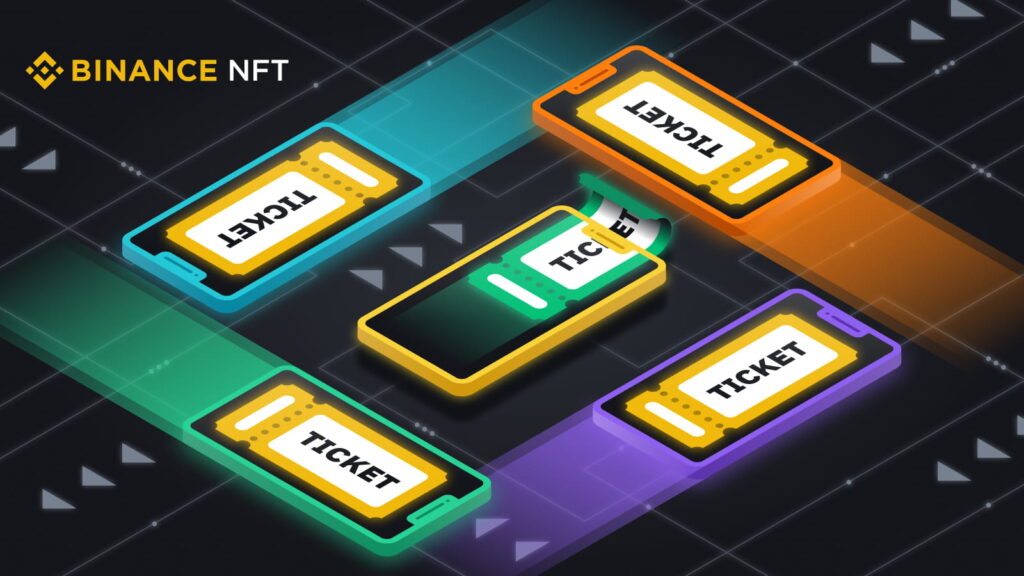What Is Nft Ticketing And How Does It Work?

An NFT ticket is a digital ticket that is stored and managed on a blockchain. Unlike traditional digital tickets, which can be easily counterfeited or double-booked, NFT tickets are unique and tamper-proof. This makes them a more secure and reliable way to manage event tickets.
- Enhanced fan engagement: NFT tickets can be used to unlock exclusive content and experiences for fans, such as backstage passes meet-and-greets, or virtual reality experiences.
- New revenue streams: Event organizers can use NFT tickets to generate new revenue streams, such as by selling limited-edition tickets or by offering secondary marketplaces for fans to resell their tickets.
- Greater control over the ticketing process: Event organizers have more control over the ticketing process with NFT tickets, as they can set prices, limit resale, and even track the ownership of tickets.
NFT ticketing is still a relatively new technology, but it has the potential to revolutionize the way that event tickets are managed and sold. As the technology continues to develop, we can expect to see even more innovative uses for NFT tickets in the future.
the most popular NFT ticketing platforms
- GET Protocol: GET Protocol is a decentralized ticketing platform that uses blockchain technology to create and manage NFT tickets.
- YellowHeart: YellowHeart is a ticketing platform that uses NFTs to create collectible tickets for events.
- SeatGeek: SeatGeek is a major ticketing platform that has begun to experiment with NFT tickets.
NFT ticketing is a rapidly evolving industry, and there are many other companies and platforms that are developing NFT ticketing solutions. As the technology matures, we can expect to see even more adoption of NFT tickets in the years to come.
How does NFT ticketing work?
NFT ticketing is a new and innovative way to manage and distribute event tickets. It uses blockchain technology to create unique and verifiable digital tokens that represent ownership of a ticket. This provides several advantages over traditional ticketing methods, including:
- Reduced fraud and counterfeiting: NFT tickets are stored on a blockchain, which is a decentralized and secure ledger. This makes it very difficult to counterfeit or tamper with NFT tickets.
- Greater control for event organizers: Event organizers can use NFT tickets to control how their tickets are sold and resold. For example, they can set price limits or restrict resale to specific platforms.
- New revenue opportunities: NFT tickets can be programmed with additional features, such as access to exclusive content or discounts. This can create new revenue streams for event organizers.
Here is how NFT ticketing typically works:
- Create the NFT tickets: Event organizers create NFT tickets using a blockchain platform. They can specify the number of tickets, the price, and any additional features.
- Sell the NFT tickets: Event organizers can sell NFT tickets directly to fans or through a ticketing platform. Fans can purchase NFT tickets using cryptocurrency or traditional payment methods.
- Verify ownership: When a fan arrives at the event, they can present their NFT ticket to gain entry. The ticket will be verified on the blockchain to ensure that it is valid.
NFT ticketing is still in its early stages of development, but it has the potential to revolutionize the ticketing industry. It is already being used by a number of major events, and it is likely to become more popular in the years to come.
the potential benefits of NFT ticketing
- Reduced costs: NFT ticketing can reduce costs for event organizers by eliminating the need for physical tickets and ticket printing.
- Increased efficiency: NFT ticketing can make it easier and more efficient to manage and distribute tickets.
- Improved fan experience: NFT ticketing can provide fans with a more secure and personalized experience.
Overall, NFT ticketing is a promising technology that has the potential to improve the ticketing industry for both event organizers and fans.
NFT ticketing vs. traditional ticketing
Traditional ticketing involves the sale of paper or digital tickets through box offices, ticketing websites, and authorized resellers. These tickets typically grant admission to the event once and may be rendered worthless after the event is over.
NFT ticketing, on the other hand, utilizes blockchain technology to generate unique, non-fungible tokens (NFTs) that represent ownership of a particular event or experience. These NFTs are stored on a distributed ledger, making them tamper-proof and verifiable. NFT tickets can also be programmed to offer post-event utilities, such as discounts or exclusive offers for the next event.
Here is a table summarizing the key differences between NFT ticketing and traditional ticketing:
| Feature | NFT Ticketing | Traditional Ticketing |
|---|---|---|
| Technology | Blockchain | Paper or digital |
| Security | Highly secure | Vulnerable to fraud and counterfeiting |
| Transferability | Easily transferable | Difficult to transfer |
| Post-event utility | Can offer post-event benefits | Typically have no post-event value |
Here are some of the potential benefits of NFT ticketing:
- Reduced fraud and counterfeiting: NFT tickets are unique and tamper-proof, making them very difficult to counterfeit. This can help to reduce fraud and protect consumers.
- Increased transparency: The blockchain provides a transparent record of all ticket transactions, which can help to improve accountability and reduce the risk of scams.
- New revenue streams: NFT tickets can be programmed to offer post-event benefits, such as discounts or exclusive content. This can be a new revenue stream for event organizers.
- Enhanced fan engagement: NFT tickets can be used to create a more immersive and engaging experience for fans. For example, they could be used to unlock exclusive content or experiences.
Here are some of the potential challenges of NFT ticketing:
- Lack of awareness: Many people are still not familiar with NFT technology, which could limit adoption.
- Environmental impact: The blockchain is energy-intensive, which could raise environmental concerns.
- Scalability: It is unclear whether the blockchain can scale to support a large volume of ticket transactions.
Overall, NFT ticketing has the potential to revolutionize the ticketing industry. However, there are some challenges that need to be addressed before it can become widely adopted.
Here are some of the companies that are currently working on NFT ticketing solutions:
- NFTify is a white-label NFT ticketing platform that allows event organizers to create and sell NFT tickets.
- YellowHeart is a ticketing platform that uses blockchain technology to verify tickets and prevent fraud.
- SeatlabNFT is a marketplace for NFT tickets.
It is still early days for NFT ticketing, but it is a technology with the potential to change the way we buy and sell tickets.
Benefits of NFT ticketing
NFT ticketing is a new and emerging technology that has the potential to revolutionize the way we attend events. By using blockchain technology to create unique and verifiable tickets, NFTs can help to eliminate ticket fraud, reduce costs, and provide a more secure and transparent experience for both fans and event organizers.
Here are some of the benefits of NFT ticketing
Enhanced Security
NFTs are stored on a blockchain, which is a decentralized and tamper-proof ledger. This means that NFT tickets cannot be forged or counterfeited, which makes them much more secure than traditional paper tickets.
Reduced Costs
NFT ticketing can help to reduce the costs associated with traditional ticketing systems. There are no printing or shipping costs for NFT tickets, and the blockchain technology can help to automate many of the ticketing processes.
Improved Scalability
NFT ticketing can be used to scale events to millions of attendees. The blockchain technology can handle a large volume of transactions without slowing down or crashing.
New Revenue Opportunities
NFT tickets can be used to create new revenue opportunities for event organizers. For example, event organizers can sell NFT tickets that include exclusive perks, such as access to meet-and-greets or VIP experiences.
Increased Fan Engagement
NFT tickets can be used to increase fan engagement. For example, event organizers can use NFT tickets to create interactive experiences, such as scavenger hunts or games.
Environmental Benefits
NFT ticketing can help to reduce the environmental impact of events. There is no paper waste associated with NFT tickets, and the blockchain technology is more energy efficient than traditional ticketing systems.
benefits of NFT ticketing
- NFT tickets can be easily transferred between fans. This makes it easier for fans to sell or give away their tickets.
- NFT tickets can be used to collect data about fans. This data can be used to personalize the fan experience and improve marketing campaigns.
- NFT tickets can be used to create new forms of fan engagement. For example, event organizers can use NFT tickets to create interactive experiences or to reward fans for their loyalty.
Overall, NFT ticketing has the potential to revolutionize the way we attend events. By providing a more secure, transparent, and engaging experience, NFT ticketing can make events more enjoyable for both fans and event organizers.
Here are some examples of how NFT ticketing is being used today:
- Ticketmaster is using NFT ticketing for a number of events, including concerts, festivals, and sporting events.
- StubHub is also using NFT ticketing for a number of events.
- The NBA is using NFT ticketing for its Top Shot collectibles.
It is still early days for NFT ticketing, but it is clear that this technology has the potential to change the way we attend events.
Risks associated with NFT ticketing
NFT ticketing is a new and emerging technology that has the potential to revolutionize the way we buy and sell tickets to events. However, there are also some risks associated with NFT ticketing that potential users should be aware of.
Here are some of the key risks associated with NFT ticketing
Volatility: The value of NFTs can be volatile and subject to quick changes. This means that the value of an NFT ticket could dramatically decline before the event. For example, if an event is canceled or rescheduled, the value of the NFT ticket could plummet.
Lack of regulation: There is currently no regulation of the NFT market, which means that there is no consumer protection or monitoring. This makes it easier for scammers to operate and for consumers to be scammed.
Technical issues: NFTs are a relatively new technology, and there can be technical issues that can delay or even prevent transactions. For example, if there is a problem with the blockchain network, it could be difficult or impossible to buy or sell NFT tickets.
Complexity: NFTs can be complex and challenging to understand. This can make it difficult for some users to buy, sell, or handle NFT tickets.
Data privacy and security: NFTs store transaction data on a public blockchain, which can raise privacy concerns for some users. There is also a risk of hackers stealing NFT tickets or the data associated with them.
Environmental concerns: The creation and transaction of NFTs can be energy-intensive, which can contribute to a significant carbon footprint.
Scalability: As the NFT ticketing market grows, it will be important to ensure that the technology can scale to meet demand. If the technology is not scalable, it could lead to congestion and delays.
Acceptance: In order for NFT ticketing to be widely adopted, it will need to be accepted by both event organizers and ticket buyers. If either group is resistant to the technology, it could limit its adoption.
Despite these risks, NFT ticketing has the potential to offer a number of benefits over traditional ticketing methods. These benefits include:
- Security: NFTs are tamper-proof and cannot be counterfeited. This can help to prevent fraud and ensure that tickets are valid.
- Transparency: The entire NFT ticketing process is transparent and traceable. This can help to build trust between event organizers and ticket buyers.
- Ownership: NFT tickets provide clear ownership rights to ticket holders. This can allow ticket holders to resell their tickets or use them to access exclusive content or experiences.
- Monetization: NFTs can be used to monetize events in new ways. For example, event organizers could sell NFT tickets that provide access to exclusive content or experiences.
NFT ticketing is still in its early stages of development, and it is unclear how successful it will be in the long run. However, the technology has the potential to offer a number of benefits over traditional ticketing methods, and it will be interesting to see how it develops in the years to come.
The future of NFT ticketing
NFT ticketing is a relatively new concept, but it has the potential to revolutionize the ticketing industry. NFTs, or non-fungible tokens, are unique digital assets that can be used to represent ownership of anything, including tickets. NFT tickets offer several advantages over traditional tickets, including:
- Increased security: NFTs are stored on a blockchain, which is a distributed ledger that is very secure and tamper-proof. This makes it very difficult to counterfeit NFT tickets.
- Reduced fraud: NFT tickets can only be transferred between owners with the correct authorization. This makes it very difficult to resell tickets illegally.
- New revenue streams: NFT tickets can be programmed to include royalty payments for artists and event organizers. This could create new revenue streams for the music and entertainment industries.
As a result of these advantages, NFT ticketing is likely to become more popular in the future. In particular, NFT ticketing is likely to be used for:
- Concerts and other live events: NFT tickets could be used to give fans access to exclusive content, such as behind-the-scenes footage or meet-and-greet opportunities.
- Sporting events: NFT tickets could be used to give fans access to unique experiences, such as VIP access or the opportunity to meet players.
- Virtual events: NFT tickets could be used to give attendees access to exclusive virtual experiences, such as meet-and-greets with speakers or access to virtual backstage areas.
In addition to these specific applications, NFT ticketing could also be used to create new ticketing models. For example, organizers could create NFT tickets that give holders access to a series of events, or tickets that can be upgraded to VIP status.
Overall, NFT ticketing has the potential to revolutionize the ticketing industry by making it more secure, efficient, and fan-friendly. As the technology matures, we can expect to see even more innovative applications of NFT ticketing in the years to come.
In Conclusion:
NFT ticketing is a game-changer that brings numerous benefits to both event organizers and attendees. From eliminating counterfeit tickets to enabling unique experiences, this technology opens up a world of possibilities. As more industries adopt NFT ticketing, we can look forward to a future where attending events becomes seamless, personalized, and unforgettable. So, whether you’re a music lover, sports enthusiast, or art aficionado, get ready to embrace the exciting era of NFT ticketing.







